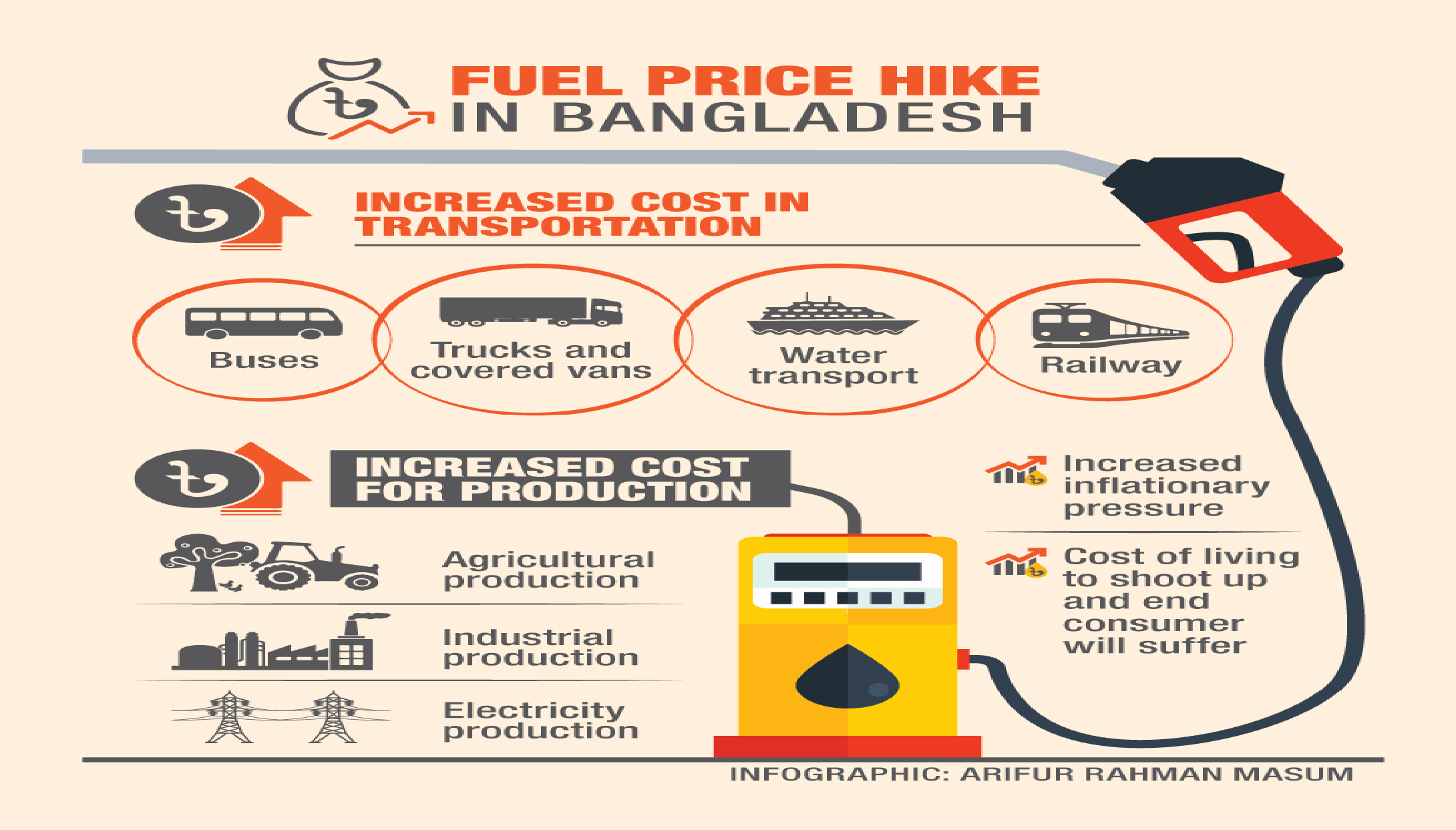
Steep fuel prices behind spiralling commodity prices

Experts on Wednesday said that the unprecedented 51% increase in fuel prices was likely to have lasting impacts on the economy, particularly agriculture manufacturing industries - given the recent rise in fertilizer prices and the ongoing electricity crisis.
They also said that the move to increase fuel prices came at a time when the country was already reeling from multiple challenges and that it would skyrocket the cost of living, and also escalate consumer sufferings, in the form of higher production and transportation costs.
Experts said this during a discussion titled "Record Fuel Price Hike in Bangladesh: Could It Be Avoided", organized by the Centre for Policy Dialogue (CPD) in the capital on Wednesday.
They further said that the people were already struggling to make their ends meet due to the ongoing inflationary pressure, added with soaring essential commodities’ prices, and by raising fuel prices by such a large margin, the government was pushing lower-income people to survive with bare necessities.
“Such fuel prices will fuel more inflation. The cost of transportation will increase. Bus fares have already gone up. Agricultural production costs will also increase as many farmers use diesel-powered pumps, which in turn would decrease our production leading to increased import costs,” said Fahmida Khatun, executive director at CPD.
The impact of the hike will have a multiplier effect on the economy. It will push up the current 7.5% inflation to a higher level, she added.
Many nations across the globe have the tendency to earn or generate revenue from fuel and the government has hiked diesel prices with the same intent, said Ijaz Hossain, former professor of Energy and Sustainable Development at Bangladesh University of Engineering and Technology (Buet).
However, diesel prices remain low in all countries as subsidizing diesel is a common practice in developing countries. Not subsidising diesel will cause many adverse impacts to the economy especially transport and agriculture, even fueling more inflation, he added.
Bangladesh Jatri Kalayan Samity's Secretary General Mozammel Haque Chowdhory said that a passenger's monthly expense in transport would go up by Tk2,100-6,000, causing a huge social impact amid high inflation.
On the other hand, former agriculture secretary Anwar Faruque said that the cost of rice production will go up by Tk1,000 per bigha due to the latest fuel price hike.
The price of coarse rice will even go up to Tk60 per kg in the coming season, he also said.
Considering this, the cost of rice production per hectare (1 hectare equals 3.95 bigha) will go up by Tk4,000, the specialist feared.
Faruque urged the government to immediately announce the price for the procurement of paddy in the next boro season.
Otherwise, farmers will not be encouraged to produce rice fearing the loss which will jeopardize food security, he further said.
BPC losses
During the session, experts also highlighted that the mismanagement, system loss and a weak supply chain of the Bangladesh Petroleum Corporation (BPC) have become a perennial problem.
They said that the government argued that BPC lost Tk8,014.54 crore during February-July 2022 due to high import prices and that at this rate, the company would become penniless soon.
However, CPD data from the Finance Ministry showed that before and during the Covid pandemic, BPC’s profits increased by a higher amount as global fuel prices were low for about eight years.
According to the Economic Review 2022 of the Finance Ministry, the BPC earned a net profit of Tk48,122 crore between FY14-15 and FY21-22 (up to May 23, 2022).
The government's move to increase fuel prices by over 50% could have been avoided with the savings of BPC, CPD Research Director Khandaker Golam Moazzem said.
The prices of diesel and kerosene have been increased to Tk114 from Tk80 per litre – indicating a whopping 42.5% rise. The price of octane has been raised by 51.7% - from Tk89 to Tk135 per litre.
Similarly, the price of petrol has been increased to Tk130 from Tk86 per litre– exhibiting a 51.2% increase.
The think tank urged the government to revert the decision for the fuel price hike.
As per CPD, the price of octane per litre in Bangladesh is Tk10 higher compared with the price in neighbouring India while the price of diesel is Tk2 higher.
The price of octane is Tk29 higher and diesel by Tk16 compared to Vietnam which is Bangladesh's biggest competitor in the global RMG market.
Editor & Publisher: S. M. Mesbah Uddin
Published by the Editor from House-45,
Road-3, Section-12, Pallabi, Mirpur
Dhaka-1216, Bangladesh
Call: +01713180024 & 0167 538 3357
News & Commercial Office :
Phone: 096 9612 7234 & 096 1175 5298
e-mail: financialpostbd@gmail.com
HAC & Marketing (Advertisement)
Call: 01616 521 297
e-mail: tdfpad@gmail.com